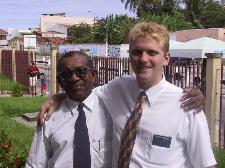How to Recover from a Serious Sin
by -
Step 1: Be Honest with Yourself
The first step to spiritual recovery is to be honest with yourself. Your sin is ruining your life, and you don’t have the power to overcome it. You need the help of Jesus Christ. Get rid of your pride and stop lying to yourself. Stop pretending like your sin isn’t really that serious. Stop trying to blame your behavior on other people. Stop pretending like your choices aren’t effecting those around you.
Make a list of all the ways your current behavior contradicts your core beliefs. Ask yourself why you continue to do things that you yourself find so repugnant. Writing things down is very helpful; it will help you organize your thoughts.
Step 2: Have Hope and Trust

Through the sacrifice of Jesus Christ, we can overcome sin. (Reflections of Christ)
Aside from having hope, you need to trust in God. Your sins are never going to bring you spiritual peace. Instead, abandon your own will and adopt the will of God. There are many things in your life that you can’t change, but you can choose to put your life in His hands. Submit and surrender to Him. He’s willing to apply His saving power in your life no matter how many times you sin. He’s always there for you.
To show your submission, start going to church every Sunday. Study the promises you made to God when you were baptized. Talk with your bishop or branch president about your renewed commitment. I’m certain he’ll be happy to support you.
If you’re not a member of The Church of Jesus Christ of Latter-day Saints, you can still worship with us. Religion should be an important part of your spiritual recovery.
Step 3: Accept the Truth and Confess
With hope and trust in God, you’re ready to face the truth. Fearlessly write down everything you’ve done, no matter how painful, difficult, or embarrassing. Also list the attitudes and thoughts that produced your bad behaviors. Don’t make excuses. Be honest with yourself. How have your negative thoughts, emotions, and actions damaged the lives of others? Creating a thorough list will take some time. Don’t feel like you need to rush. Each time you sit down to work on your list, pray to God for help and personal insight.
Once you’ve identified your past mistakes, confess your sins to your Heavenly Father in the name of Jesus Christ. Ask Him for forgiveness. Ask Him for strength to avoid sin. God loves you so much! He’s very happy that you’re trying to make your life right.

A missionary hugging a bishop in Aracaju, Sergipe, Brazil.
Don’t fear excommunication. For the vast majority of sins, excommunication isn’t necessary. In the rare cases when it is necessary, it’s nothing more than an important step on the path to repentance. It will allow you to eventually be rebaptized, and baptism is a beautiful, spiritually cleansing ordinance.
Step 4: Seek a Change of Heart
Now that you’ve confessed your sins, take your list of negative attitudes, feelings, and actions and tear it up. There’s no need to dwell on your past mistakes at this point. God gave you healthy guilt when you sinned so you’d feel compelled to become a better person. There’s no need to feel guilt for sins that have been overcome. You’re moving forward, not looking backwards. Christ is helping you triumph over your sin.
Some people think that if they don’t forever hold on to some guilt, their repentance hasn’t been valid. Guilt is a consequence of sin, not a sign of repentance. Your suffering will not save you. Only Christ’s suffering can do that. You should feel guilty just as long as it takes for you to recover spiritually, and not for one moment longer.
It’s also important to distinguish between guilt and shame. We feel guilt when we’ve done something that is terrible. We feel shame when we think that we personally are terrible. It’s appropriate to feel bad when we make poor decisions, but we should never question our personal value as children of God.
Hopefully you’ve been successful at avoiding sin, but you want more than that. You want to lose the desire to sin. You want to change your heart. That kind of change is a life-long process, not a single event.
How do you change? First, do your part. Search your mind, and you’ll almost certainly discover there’s still a little bit of pride there. We all have it. It comes from the idea that we know better than God what’s best for us. Try to distance yourself from that pride by putting your life entirely in Christ’s hands. Continue to go to church and to study the scriptures, especially scriptures about forgiveness and the atonement. Accept that you are, like all of us, a sinner. You’ll always be a sinner. We’re all forever dependent on Christ’s redeeming grace.
After you’ve done your part, ask God to do His. Pray with all your strength, begging our Heavenly Father to free you from your desire to sin. Don’t hold anything back. Temptations can’t always be entirely eliminated–even Jesus was tempted in the wilderness–but God can fill you with so much love that temptations are entirely overpowered. Ask Him for that kind of powerful change of heart. It probably won’t happen all at once, but be persistent. God will change you in His own due time.
Step 5: Seek Forgiveness
Next, write down a list of all the people who’ve been harmed by your destructive attitudes, emotions, and actions, whether because of things you did or things you neglected to do. Perhaps some of these same people have also harmed you. It’s quite common for people to respond to destructive behavior with destructive behavior of their own. Forgiving and asking for forgiveness often go hand in hand. Regardless, resist the temptation to justify, excuse, or diminish your behavior.
Once you’ve finished your list, you have two additional tasks. First, add your own name. Your sin harmed you more than anyone else. Second, write down the feelings you associate with each of the people on your list. Pray for each of them every day. Cultivate compassionate feelings for those who have wronged you.
Once the proper compassion has been cultivated, you must make restitution. You shouldn’t procrastinate your repentance, but it’s not a good idea to be impulsive or careless either. Chat with your bishop or branch president for guidance. He’ll be able to help you proceed with wisdom and caution.
Try to meet with each of the people you’ve harmed in person, as long as meeting with them won’t cause further pain. Put aside every impulse of pride or self justification, even if they’ve also hurt you in the past. Your purpose is not to explain yourself or describe your side of things. It’s not to criticize or argue. Simply state your apology briefly and specifically, without unnecessary details. Make restitution whenever possible. If the person you’ve harmed doesn’t wish to discuss the matter with you, respect his wishes.
Sometimes it might not be possible to speak with the person you’ve harmed. Perhaps he’s passed away, there are legal restrictions, or you can’t discover where he lives. In this case, ask for forgiveness indirectly. Write a letter, even if you can’t deliver it; give money to the person’s favorite charity; help others as a way of honoring the person’s memory; etc.
Step 6: Maintain Your Spirituality

Through prayer, we can communicate with our Heavenly Father. He's anxious to guide and help us.
If you mistreat anyone in your life, apologize and make amends as quickly as possible. Saying “I was wrong” is often just as important as saying “I love you.”
You turned to sin in the past for happiness and fulfillment; now you need to turn to God. Study the scriptures and pray fervently and regularly. As you grow closer to our Heavenly Father, the most important revelation He will give you is this: He loves you despite what you’ve done. He’s always loved you.
Seek out service as another important way to maintain your spirituality. When we awaken spiritually, we naturally want to help others. Use the life experiences you’ve gained to help others. Share the gospel of Jesus Christ with your friends and family. Offer love and support to others who have committed serious sins. Learn to place the needs of others before your own.
Conclusion
I hope this article helps those who have struggled with serious sins. Repentance truly is a miraculous and beautiful process. I love the words of Isaiah: “Come now, and let us reason together, saith the Lord: though your sins be as scarlet, they shall be as white as snow; though they be red like crimson, they shall be as wool” (Isaiah 1:18). That’s the power of Christ’s atonement. God bless you.